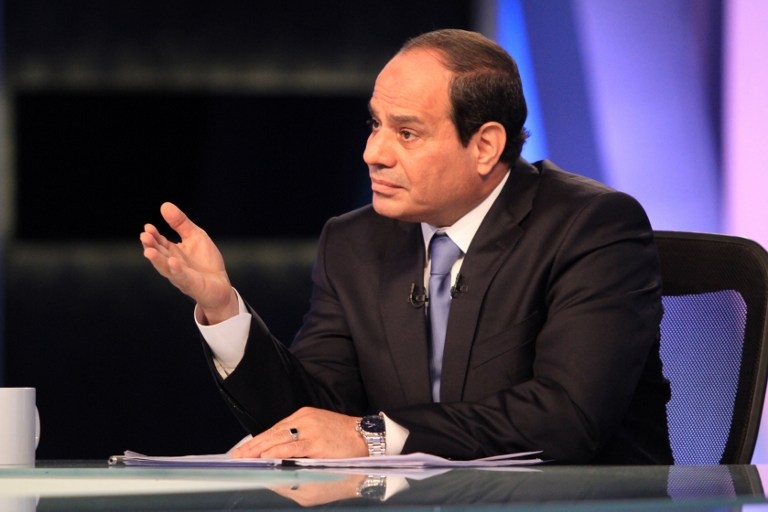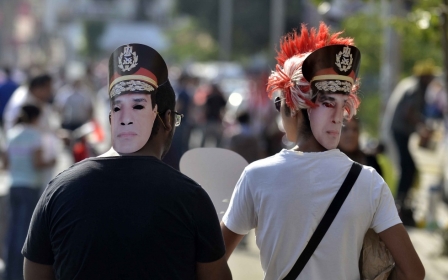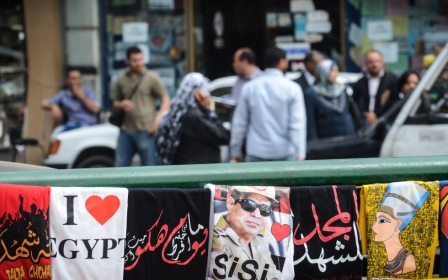Sisi defies Salafist support with secular pledge

If elected, former army chief Abdel Fattah al-Sisi is not bound by any agreement to allow for religiously affiliated political parties, the Egyptian presidential hopeful said in an interview televised on Monday.
Presenters on the CBC channel, which pre-recorded Sisi's first campaign interview run across the country late Monday, pushed him to admit that the Nour Party will likely be banned under his presidency.
The matter, Sisi responded, was decided when Egypt's new constition - which does not allow for political parties to be based on religion - was signed last December. The 50-member panel tasked with drafting the constitution included a Nour party member, who - with reservation - did vote for passing it.
"I am not bound by any obligation," he said.
Sisi's comments are likely to embarass the Nour Party, which pledged its support for the candidate on Saturday.
"After reviewing the results of the [Nour] party's meetings with presidential candidates, Sisi and [leftist politician Hamdeen] Sabahi, the High Commission for the Nour Party decided to support Abdel Fattah al-Sisi, following a majority of votes," tweeted Nader Bakkar, the party's co-founder and vice president for media affairs.
The party called on Egyptians to vote in the upcoming elections, adding that it found Sisi "more appropriate than his opponent for this stage", according to a statement released by the party also on Saturday. "We also urge supporters of each candidate to make a pact to keep the identity of the nation," the statement added.
Established after Egypt's 25 January 2011 revolution, the Salafists made up the second largest bloc after the Muslim Brotherhood in the country's first democratically elected parliament. The bloc was more vocal about the "Islamic identity" of Egypt during the drafting of the 2012 constitution than members belonging to the now banned Muslim Brotherhood. The group, for example, insisted on clauses in the constitution to define Islamic law.
However, since the coup which ousted President Mohamed Morsi on 3 July, the Nour Party has made concessions in order to "preserve the bare minimum of Islamists' interests in the country", said Ahmed Meiloud, a specialist in political Islam and a researcher with the Southwest Initiative for the Study of MIddle East Conflicts at the School of Middle Eastern and North African studies at the University of Arizona.
"[The Nour Party] is unable to influence the course of events, yet cannot pull back from its support for the current 'roadmap'," Meloud said. "Unlike the Muslim Brothers who have a long history of confronting the establishment, the Nour founders have thrived under the aegis of the Mubarak state and, all indications, suggest they are not willing to go against the state."
Sisi, Meiloud added, has little to lose from unnerving Nour - and quite a bit to gain.
"Sisi is quite aware of Nour's predicament and of the fact that for the Salafists, any incentive - whether in the form of limited political participation, or the chance to have their media spared the ban on opponent media outlets, or simply to be able to preach in their mosques - is a victory," he said. "Keeping accord with the liberals and the deep state at the expense of unnerving Nour is a risk Sisi can comfortably take."
Egypt's election is schedule for 26-27 May. Sisi will face off with Hamdeen Sabahi of the Nasserist Party.
Middle East Eye propose une couverture et une analyse indépendantes et incomparables du Moyen-Orient, de l’Afrique du Nord et d’autres régions du monde. Pour en savoir plus sur la reprise de ce contenu et les frais qui s’appliquent, veuillez remplir ce formulaire [en anglais]. Pour en savoir plus sur MEE, cliquez ici [en anglais].




